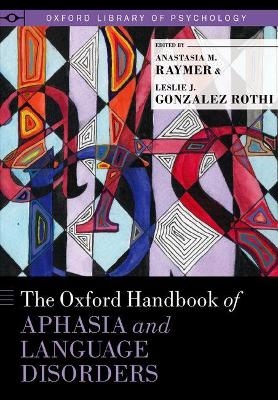
The Oxford Handbook of Aphasia and Language Disorders
Oxford University Press Inc (Verlag)
978-0-19-977239-1 (ISBN)
What is immediately clear when meeting individuals with acquired brain damage is that the patterns of communication impairments vary in remarkable ways among these individuals. Aphasia and related communication disorders, while devastating life events for individuals who acquire brain damage, provide lessons of considerable interest to many clinicians and researchers trying to understand the brain's neurological and psychological complexity and develop methods to facilitate optimum recovery of lost language and communication functions following brain damage. The Oxford Handbook of Aphasia and Language Disorders weaves theoretical and neurological foundations with rational, motivated clinical approaches to assessment, diagnosis, and intervention for aphasia and related communication disorders. The contributing authors, experienced clinicians and scientists with strong backgrounds in neurological and cognitive neuropsychological theories, bridge theory to clinical practice, reviewing the extant literature in each aphasia syndrome while exploring implications for guiding clinical decision-making.
Introductory chapters provide historical perspectives on the aphasia syndromes following left hemisphere brain damage, and review aphasia assessment across the decades. The bulk of the Handbook covers aphasia syndromes, with chapters that describe each aphasia syndrome in detail, including behavioral, neural, and cognitive neuropsychological correlates and methods to assess and treat each syndrome. Additional chapters provide insights into acquired reading and writing disorders and social and prosodic communication disorders that follow damage to the right cerebral hemisphere. The final chapters examine neural perspectives on aphasia recovery and principles of neuroplasticity in aphasia treatment. As such, this book integrates neural, cognitive, and clinical perspectives to provide a broad understanding of the complexity of language and impairments that can arise following acquired brain damage, and will be of interest to scholars and clinicians in the speech-language, neuropsychology, and rehabilitation professions.
Anastasia Raymer, PhD, CCC-SLP, is Professor and Chair of the Department of Communication Disorders and Special Education at Old Dominion University in Norfolk, Virginia. She is recognized for her research, supported by the National Institutes of Health (NIH) and the Department of Defense, to optimize rehabilitation of aphasia, limb apraxia, and agraphia. She is past-president of the Academy of Neurologic Communication Disorders and Sciences, and a Fellow of the American Speech-Language-Hearing Association. Leslie Gonzalez Rothi, PhD, CCC-SLP, is Professor Emeritus in the Department of Neurology at the University of Florida. She is known for her work, supported by the NIH and Veterans Administration (VA), examining neural and cognitive correlates of aphasia and related disorders and the integration of principles of neuroplasticity to maximize rehabilitation outcomes. She is past-president of the International Neuropsychological Society and the Academy of Neurologic Communication Disorders and Sciences; is a Fellow of the American Psychological Association Division 40; and is a Fellow and recipient of Honors of the American Speech-Language-Hearing Association.
About the Editors
Contributors
Part One: Introduction
1: Aphasia Syndromes: Introduction and Value in Clinical Practice
Anastasia M. Raymer and Leslie J. Gonzalez Rothi
2: Aphasia Syndromes and Information Processing Models: A Historical Perspective
Kenneth M. Heilman
3: Aphasia Assessment
Janet P. Patterson
Part Two: Aphasia Syndromes
4: Wernicke's Aphasia: Auditory Processing and Comprehension
Margaret L. Greenwald
5: Conduction Aphasia: Impaired Phonological Processing
Carolyn E. Wilshire
6: Semantic Processing in Transcortical Sensory Aphasia
Jamie Reilly and Nadine Martin
7: Anomia and Anomic Aphasia: Implications for Lexical Processing
Stacy M. Harnish
8: Broca's Aphasia and Grammatical Processing
Lynn M. Maher
9: Global Aphasia
Elizabeth E. Galletta and A. M. Barrett
10: Transcortical Motor Aphasia
Bruce A. Crosson, Anastasia Ford, and Anastasia M. Raymer
11: Mixed Transcortical Aphasia: Repetition without Meaning
Annette Baumgärtner
12: Acquired Alexias: Mechanisms of Reading
Ellyn A. Reilly, Elizabeth Brookshire, and Diane L. Kendall
13: Acquired Dysgraphias: Mechanisms of Writing
Pélagie Beeson and Kindle Rising
Part Three: Language and Right Hemisphere Damage
14: Discourse and Social Cognition Disorders Affecting Communication Abilities
Maximiliano A. Wilson, Bernadette Ska, and Yves Joanette
15: Right Hemisphere Damage and Prosody
Susan A. Leon, Amy D. Rodriguez, John C. Rosenbek
Part Four: Clinical Implications
16: Biological Markers of Aphasia Recovery after Stroke
Marcus Meinzer, Lena Ulm, and Robert Lindenberg
17: Principles of Aphasia Rehabilitation
Anastasia M. Raymer and Leslie J. Gonzalez Rothi
Index
| Erscheinungsdatum | 15.02.2018 |
|---|---|
| Reihe/Serie | Oxford Library of Psychology |
| Zusatzinfo | 46 |
| Verlagsort | New York |
| Sprache | englisch |
| Maße | 257 x 178 mm |
| Gewicht | 798 g |
| Themenwelt | Geisteswissenschaften ► Psychologie ► Allgemeine Psychologie |
| Geisteswissenschaften ► Psychologie ► Biopsychologie / Neurowissenschaften | |
| Geisteswissenschaften ► Psychologie ► Pädagogische Psychologie | |
| Geisteswissenschaften ► Psychologie ► Verhaltenstherapie | |
| Geisteswissenschaften ► Sprach- / Literaturwissenschaft ► Sprachwissenschaft | |
| Medizin / Pharmazie ► Gesundheitsfachberufe ► Logopädie | |
| Medizin / Pharmazie ► Medizinische Fachgebiete ► Neurologie | |
| ISBN-10 | 0-19-977239-8 / 0199772398 |
| ISBN-13 | 978-0-19-977239-1 / 9780199772391 |
| Zustand | Neuware |
| Informationen gemäß Produktsicherheitsverordnung (GPSR) | |
| Haben Sie eine Frage zum Produkt? |
aus dem Bereich


